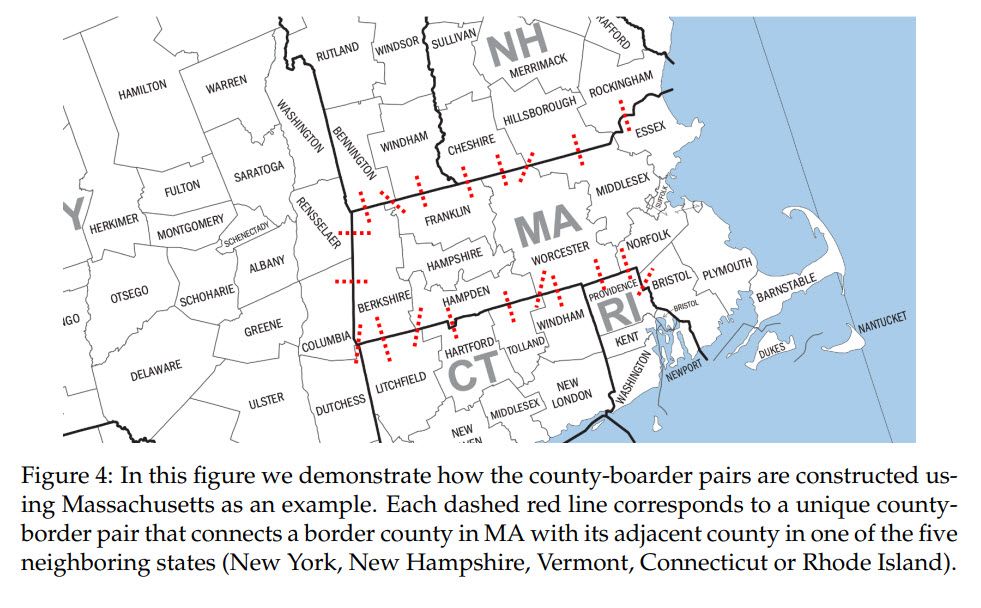Does Angi Recommend Occupational Licensing?
Peter Blair and Mischa Fisher have a clever new paper on occupational licensing that uses data on millions of leads generated by Angi’s HomeAdivsor. Consumers on HomeAdvisor search for services, the platform knows whether the service requires a license in the consumer’s state and attempts to match the consumer with an appropriate local provider, the local provider can then choose whether to accept or reject the lead. If a lead is accepted, the consumer and provider then negotiate on the price and services–as the negotiation is mostly handled offline, the main measure of interest is the probability a lead is accepted.
Many occupations are licensed in one state but not in another (as I pointed out in my talk on occupational licensing to the Heritage Foundation this is odd if you think there are strong arguments for occupational licensing on safety or quality grounds). Thus the authors compare the accepted lead rate in states that require a license to complete a task to the rate in states where the same task is unlicensed. To better control for other factors, the authors only compare the accepted lead rate in counties that border different states, as shown below. The authors also control for state, month and task fixed effects.

The bottom line is that the accepted lead rate is 12.3 percentage points or 21% lower in a county/state that license an occupation/task compared to a similar county/state where the task is unlicensed. In other words, if you live in a state that requires a license to complete a task it’s considerable more difficult to find a contractor than if you lived in nearby state that does not license the task.
Not surprisingly, the authors find that the accept rate declines not because there is a surge in demand for the licensed service but because supply declines when there are fewer licensed providers. In the long run, we also know that prices rise in licensed industries (e.g. my paper with Pizzola on licensing in the funeral services industry).
The authors combine their cross-sectional study with an event study that shows that after New Jersey required a license for pool contractors it become more difficult to find a pool contractor in New Jersey relative to other states.
The authors conclude:
The existing literature on licensing on digital platforms, which consists of three other papers, has carefully measured the impact of licensing on consumer satisfaction and safety by demonstrating that customer self-reports of service quality and objective platform measures of service provider safety do not increase in the presence of licensed service providers, despite the positive impact of licensing on prices (Hall et al., 2019; Farronato et al., 2020; Deyo, 2022).
…Taken together, our findings and those from the three others papers studying licensing in digital labor markets indicate that the traditional view of licensing espoused in Friedman (1962)
about licensing in offline markets, i.e, licensing is a labor market restriction with limited benefits, also holds in digital labor markets (Hall et al., 2019; Farronato et al., 2020; Deyo,
2022). Our work provides a clear example where labor market regulations developed to govern the analogy economy work against the efficiency gains that technological innovation promises to bring in a digital economy (Goldfarb et al., 2015).
Comments
The study should track satisfaction and quality after three years after installation, not just on the date of installation.
If you know people who have done work on their own property, or had it done by a handyman, you might get a different story, as these are not reported in the dataset. Moreover, in some states, you have to have housing inspectors review the installation or connections.
This morning I am having a new TV set installed by the store that sold it to me. I could have had a neighbor install it with me. Product manufacturers have an interest in proper installation and initial service as this may also lead to warranty claims and disputes over cause of problems. So, producers have a complementary interest in quality of service, and it is not just the trades that want licensing. In fact, producers often are the ones that certify an approved installer even where there is no government licensing for this reason. In fact, producers often have an interest in compressing installer margins as this affects the all in price of their product. Sometimes, manufacturers integrate forward into installation markets for this reason, as in windows, for example.
No one is for stupid regulation, but no one is for poor quality which shows up later when you cannot identify the cause or the service is completed and you now have to re-roof your house. Was it the roofing contractor or the material. Same for windows.
Subscribe via Email
Enter your email address to subscribe to updates.
Email Address
Contact Us
Alex Tabarrok
Email Alex
Follow @atabarrok
Tyler Cowen
Email Tyler
Follow @tylercowen
Webmaster
Report an issue
Our Web Pages
Books


